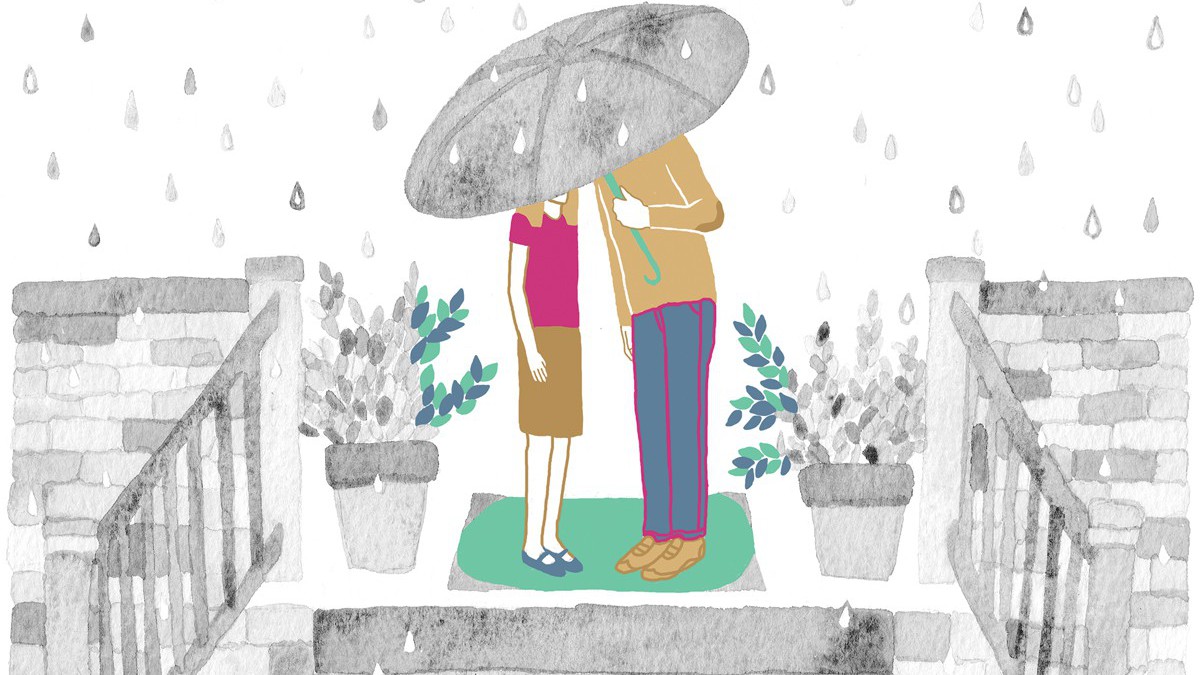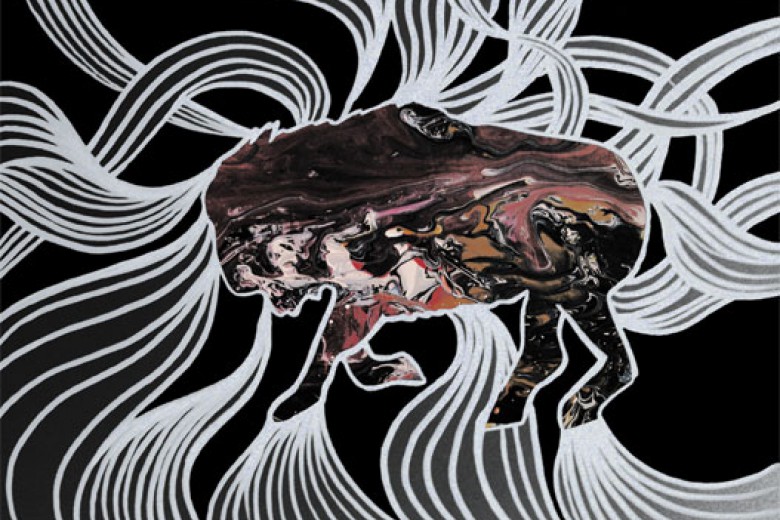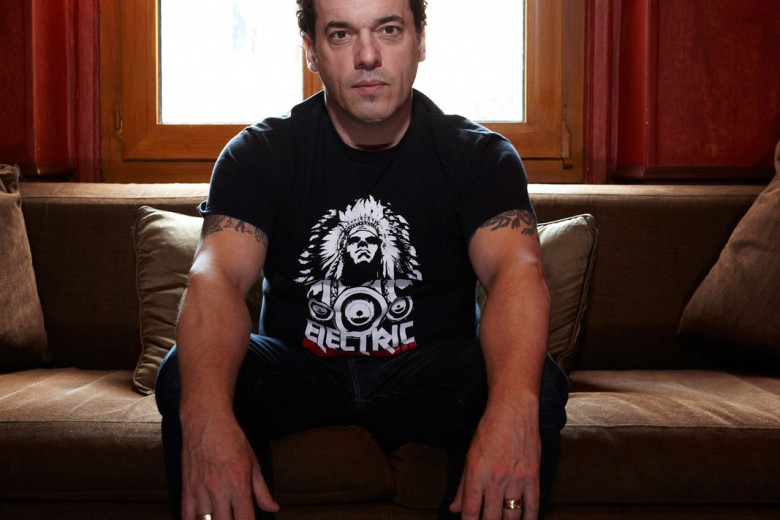Dad used to be terrified of doorbells. In all of the houses you shared with him in Toronto, the doorbells had to be dismantled and removed.
You knew from a very young age that your father had been abducted and tortured. As an adult, you wonder what knowing this did to you – and how it fucked you up to know that this violence is not only possible but permissible.
No one has ever been held accountable for the violence against your father.
…
You first learn about Dr. Ewen Cameron at the Art Gallery of Ontario. You are visiting with a friend and stumble onto Sarah Anne Johnson’s exhibit. Johnson’s grandmother was one of Cameron’s victims. In her exhibit, Johnson uses photography, pencil drawings, and small sculptures to explore the impact of being held captive and experimented on.
It is her dollhouse that creeps into you and lingers. You peer through the second-floor windows and witness the trauma and devastation that Cameron’s experiments inflicted onto Sarah’s grandmother and, by extension, Sarah.
Days afterwards you are still thinking about the dollhouse.
From Wikipedia you learn the following details: Cameron’s experiments began in the 1950s with Canadian victims. He was born on December 24, 1901, and died in 1967 of a heart attack. While he was torturing humans on Canadian soil, Cameron earned a hefty salary of $69,000; at that time, he was the president of the Canadian and World Psychiatric Associations.
There is a photograph of Cameron on Wikipedia. In the photograph, he is wearing rectangle-shaped glasses; his lips are stretched into a smirk. He is looking slightly to the right, as if he does not want to look directly at the camera.
Does this mean he could feel shame?
…
You have good memories of Dad, not just scary things; not everything was terrible.
You remember the way he stood by the screen door with an umbrella – door slightly ajar – to watch the rain. On those days, you would stand beside him, sharing the space under the umbrella, your bodies so close – almost touching. In those days, it felt like the rain was something magical, a canopy of calm that could protect you and hold you.
…
At first, Cameron proposed that he could repair mental illness – schizophrenia, anxiety, depression, postpartum depression, and in one case, help with marital issues – by erasing an individual’s memories and sense of self, and then creating an entirely new personality stripped of mental illness.
He called his method “psychic driving.” His first goal was to revert patients to a state where they could not feed themselves or go to the washroom on their own, and where they’d forget who they used to be. He achieved this by administering high doses of insulin, inducing weeks-long comas, keeping patients in isolation, and administering LSD, PCP, and up to six times more electroshock therapy than was considered safe at the time. Once the patient’s personality had been wiped clean, he attempted to craft a new personality by forcing his victims to listen to recorded messages for 16 to 20 hours a day for weeks. The crafting of the new personality was never successful and early on, Cameron became aware that his experiments could be helpful in learning not how to erase mental illness, but how best to destroy a human.
There was a young woman whom Cameron described in his notes as an intelligent young nursing student seeking help for anxiety. At the time, she was tormented by an abusive father and turned to Cameron for treatment. While she was held at the Allan Memorial Institute in Montreal, she was electrocuted, kept in isolation, and induced into a coma.
After Cameron finished with her, she needed to be bottle-fed and toilet trained.
…
You never asked Dad what they did to him in that prison in San Salvador. You know that electric shock was used against his body, but Dad has never spoken to you about it. The bits you know are from things he has told your mother and grandmother.
In your teens, you are searching through Dad’s belongings and find an article with a picture of him lying on a couch. The photograph was taken a few years after his release. You are not familiar with the publication, but it seems to have been published in Canada.
You never asked Dad what they did to him in that prison in San Salvador. The bits you know are from things he has told your mother and grandmother.
In the article, the interviewer asks Dad intimate questions about the torture he survived, but you cannot see any of Dad’s responses. Dad has used a thick black marker to hide his words.
You know you can search for the original piece. You know you can find the words that he has hidden, but you don’t. You tell yourself that you want to respect his privacy, but this is not the truth. You are, after all, rummaging through his things. You realize at that moment that you don’t want to know what those monsters did to your father.
You don’t want the images or details to linger in your body. And so, all you have are the carefully crafted questions and Dad smiling wide, wearing jeans and a T-shirt, and lying on some stranger’s couch.
…
In his 1950s lectures, Cameron talks openly about the techniques that he was using on his Canadian victims. He is receiving funding from Canada and the U.S., and housing his victims in a building at the Allan Memorial Institute.
When you tell your Mom you are reading about Cameron’s experiments, she tells you about her brother, Uncle Ernesto. He was picked up in his 20s by the secret police in San Salvador for the crime of attending a protest, or, as Mom puts it, watching student protesters pass by. Mom tells you that your uncle spent a month in a clandestine prison for his crime. Mom says that he was repeatedly placed in a bathtub and electrocuted. They broke his skull.
By some miracle, your uncle was released, but he never recovered from the torture. He struggled with alcoholism for the rest of his life and died in his early 30s.
Mom says that when Dad was released, he was a terrifying version of himself. You remember. You have a memory of Dad chasing Mom up a flight of stairs. You remember shaking and your younger brother clinging to you. You were 10 when this happened.
…
You are not surprised to read that Cameron was anti-communist and condoned the use of torture if it could help prevent the spread of those ideas.
His work eventually played a central role in developing the CIA’s manual for torture, and it is used and later shared throughout the world to terrorize Black and Brown bodies in places like El Salvador, Chile, Brazil, and most recently Iraq and Guantanamo.
…
You want to understand what happened in El Salvador. You want to understand why so much money was invested to maintain the war.
You learn that the CIA heavily funded the Salvadorian military to stop the “spread” of communism. You learn that fighting communism was code for repressing Indigenous, working-class communities for demanding basic rights, fair wages, and lower transportation costs. You learn that El Salvador is the colonial name for what was once Cuscatlán. You learn that a small colonial elite still controls El Salvador. Colloquially they are known as the 14 families.
In the ’60s, ’70s, and ’80s, people had had enough. They wanted to change the colonial-economic structure. This was a dangerous idea, even for a country as small as El Salvador.
Sometimes you wonder what kind of place El Salvador would have been if so much money had not been invested in terrorizing its people. But you don’t like thinking about what could’ve been. Two of your uncles lost their lives in that terror and one of them was disappeared. You know there is no point in thinking “what if?” – these men are gone now, and they will never be a part of your life.
Now, one of your cousins tells you that the government had a right to defend itself and its interests against the demands of the people. She thinks people were wrong to demand justice and especially wrong to fight back against violence. When she tells you that your uncle was asking for it, you walk away from her without speaking.
Mom says your cousins had to learn to think this way.
…
When you were three, your dress caught fire. You remember that you were playing with your older brother and sister on the balcony with a sparkler. It was New Year’s Eve in San Salvador. You were making tiny and large circles with your sparkler. For what feels like less than a second, your sparkler touched your white cotton dress, and then the flames were on you, spreading quickly across the surface of your dress. You were frozen and staring at them when Dad dropped you to the ground and began to slap the flames with his palms.
It was New Year’s Eve in San Salvador. You were making tiny and large circles with your sparkler. For what feels like less than a second, your sparkler touched your white cotton dress, and then the flames were on you.
Mom says that later he threw a bucket of water on you, but you don’t remember the water or if there was pain from the burns. You only remember the feeling of being rescued by your father. This show of bravery makes you proud of him. As a child, it made you feel like he could rescue you from anything.
…
When Cameron dies, he is mountain climbing with his son. You wonder if he was a good father. You wonder if his violence was only directed outside of his family.
…
When Dad is abducted, you are turning five and you, your mom, and your siblings are hiding in Mexico City. El Salvador is in a state of war.
As you read more about the war in El Salvador, you learn that the intent of the government was not so much to torture civilians for information as it was to create terror. They kidnapped high school students, union workers, farm workers, teachers, educators, social workers; students studying politics, anthropology, and sociology were especially at risk.
At the time of his abduction, your father was teaching at the university. The fact that he survived should make you feel something good. You know your uncles did not; thousands of people were disappeared and never found again. Your mother’s sociology teacher was kidnapped and murdered. Her body was never recovered. You tell yourself that you should feel happy that your father was released – that he made it home. But it’s more complicated. You wish he’d never been taken in the first place. You wish no one had ever been taken.
After his release, he cannot listen to loud noises, cannot sleep through the night; for a long while, he believes they will still come for him.
…
Some people are curious about Dad after they meet him. They gawk at him like he’s a strange animal. In Toronto, Dad worked for years with community agencies helping newcomers. The work was important to him.
Once, at a party, a woman approaches you wide-eyed and asks if you are your father’s daughter. “I worked with him,” she says, her mouth hanging slightly open as she stares at you. “I can’t even imagine what it must’ve been like to have that man as a father.” You shrug at her and walk away without responding. You are not interested in confirming what she thinks she knows about your father.
Your brother says that he is angry with him. “He put us in danger by speaking out. Why didn’t he think of the risks?” he asks. You don’t contradict your brother. You know it was hard to live with someone who had been tortured. There were so many accommodations that you as children had to make to help him through. Things you always seemed to fail at. Things you were destined to fail at. At times, he demanded complete silence. When you failed to comply, he sometimes destroyed you – he’d yell so loudly into your tiny face that you didn’t know where to stick yourself. Over the years, you learned to hold your body as he demanded – to sit quietly as he expected.
But even after all that, you don’t blame your father. You don’t think your father did anything wrong by speaking out.
You want to believe that you are the kind of person who would risk everything to speak out. But you have known silence intimately.
You don’t know what you would have done in a similar situation. You want to believe that you are the kind of person who would risk everything to speak out. But you have known silence intimately – the way it wraps itself against and through your body, sucking the language out of you.
…
You suppose it is important to mention that Dad and Cameron never met, that when your father was abducted, Cameron had already been dead for 12 years, that during the time that your father was abducted, imprisoned and tortured, he was not held at the Allan Memorial Institute, but instead, in a clandestine prison in San Salvador.
Maybe these details can absolve Dr. Ewen Cameron. Maybe, in some places, these details do absolve him.







